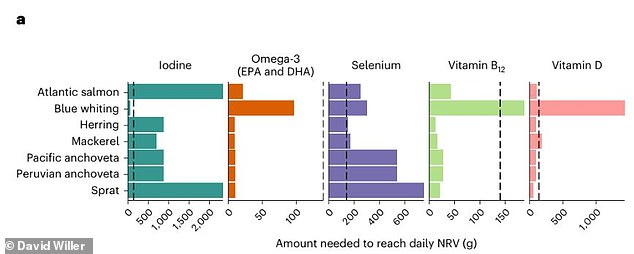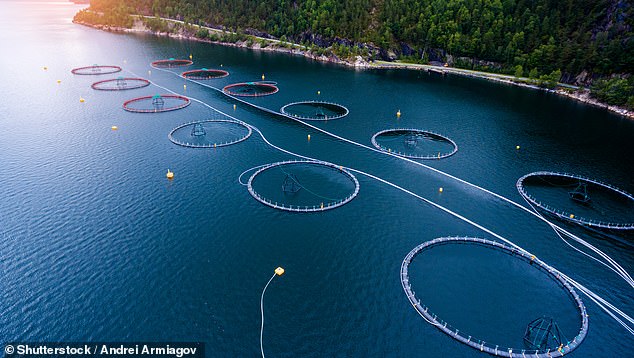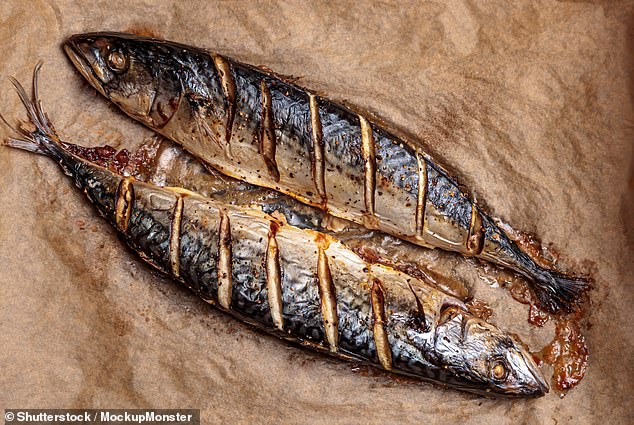Mackerel en croute? Brits are being told to swap salmon for wild fish to get essential nutrients
It’s a staple of many Brits’ diets, but experts say it may be time to say goodbye to salmon.
Scientists suggest we should replace salmon with wild fish such as mackerel, sardines and anchovies to avoid nutrient deficiencies.
Researchers from the University of Cambridge studied the flow of nutrients in salmon farms from the wild ‘feeder fish’ to the salmon that ends up on our plates.
They discovered that eating that wild fish directly can give you more than five times the nutrients of the same serving of farmed salmon.
Lead author Dr David Willer said: ‘People should consider eating an increasing variety of wild fish species such as sardines, mackerel and anchovies, to get more essential nutrients straight to their plates.’
While cod may be the nation’s favourite, scientists say switching to mackerel and chips could help Brits avoid nutrient deficiencies (file photo)

These charts show how much of each fish is needed to meet your daily nutritional needs. This shows that you would have to eat a lot more salmon to meet your daily iodine needs
In salmon farming, wild fish are usually ground up and processed into feed pellets that captive salmon can eat.
However, this farming method can be an extremely inefficient way to use nutrients.
Dr. Wiler says: ‘What we’re seeing is that most species of wild fish used for feed have a similar or greater density and range of micronutrients than farmed salmon fillets.’
The researchers found that six of the nine key nutrients in farmed salmon fillets were lower than in the fish those salmon were fed.
Wild-caught fish food contained more than five times as much calcium, four times as much iodine and one and a half times as much iron, omega-3, vitamin B12 and vitamin A.
This is especially important as many Britons do not get enough of these nutrients in their diets.

Salmon is often farmed in large industrial operations, such as this fish farm in Norway, where the fish live in large round nets
The researchers point out that women and teenage girls in particular often have deficiencies in iodine, selenium and iron.
But despite being packed with nutrients, these fish remain quite unpopular.
While 24 percent of adults in Britain eat salmon every week, only 5.4 percent eat mackerel, 1 percent anchovies and just 0.4 percent herring.
But if you make this change, you can significantly improve your health and even eat less.
The researchers suggest that feeding wild fish to salmon wasted about 80 percent of iodine and calcium, minerals that are especially important for women and teenage girls.
Because wild fish like mackerel contain many more nutrients, you can get all your daily needs from a smaller and less caloric portion size.
Dr. Willer adds: ‘Making a few small changes to our diet around the type of fish we eat can go a long way towards eliminating some of these deficiencies and improving the health of both our population and the planet .’

Although mackerel is often used to feed salmon, researchers found that they contain five times more calcium and four times more iodine than a salmon fillet (file photo)
This waste ultimately results in more fish being caught, resulting in fewer nutrients being produced.
Because more fish are needed to meet the same demand, there is an increased risk of overfishing, which can cause enormous damage to ocean ecosystems.
Research has suggested that the 887,000 tonnes of seafood Britain eats each year puts dozens of species at risk of extinction.
For this reason, some top British chefs have started to avoid farmed salmon as they worry about the impact on the environment.
The researchers say they don’t think people should give up salmon completely, but that people should try to eat more wild fish.
In their article, published in Natural foodthe researchers suggest that the most efficient system would be if humans ate about a third of all fish currently fed to salmon.
Senior author Dr James Robinson said: ‘Marine fisheries are an important local and global food system, but large catches are diverted to agricultural feed.
‘Prioritizing nutritious seafood for people can help improve both nutrition and ocean sustainability.’
